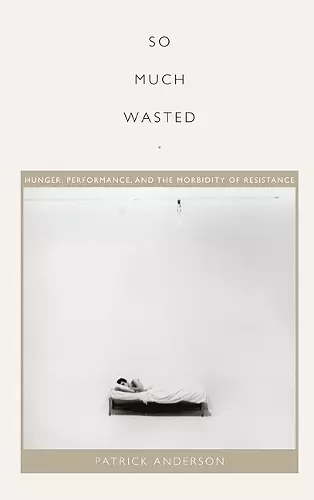So Much Wasted
Hunger, Performance, and the Morbidity of Resistance
Format:Hardback
Publisher:Duke University Press
Published:25th Oct '10
Currently unavailable, and unfortunately no date known when it will be back

An analysis of self-starvation as a significant mode of staging political arguments across the institutional domains of the clinic, the gallery and the prison
An analysis of self-starvation as a significant mode of staging political arguments across the institutional domains of the clinic, the gallery, and the prison.In So Much Wasted, Patrick Anderson analyzes self-starvation as a significant mode of staging political arguments across the institutional domains of the clinic, the gallery, and the prison. Homing in on those who starve themselves for various reasons and the cultural and political contexts in which they do so, he examines the diagnostic history of anorexia nervosa, fasts staged by artists including Ana Mendieta and Marina Abramović, and a hunger strike initiated by Turkish prisoners. Anderson explores what it means for the clinic, the gallery, and the prison when one performs a refusal to consume as a strategy of negation or resistance, and the ways that self-starvation, as a project of refusal aimed, however unconsciously, toward death, produces violence, suffering, disappearance, and loss differently from other practices. Drawing on the work of Martin Heidegger, Sigmund Freud, Giorgio Agamben, Peggy Phelan, and others, he considers how the subject of self-starvation is refigured in relation to larger institutional and ideological drives, including those of the state. The ontological significance of performance as disappearance constitutes what Anderson calls the “politics of morbidity,” the embodied, interventional embrace of mortality and disappearance not as destructive, but rather as radically productive stagings of subject formations in which subjectivity and objecthood, presence and absence, and life and death are intertwined.
“Suitable for numerous audiences—graduate courses in psychology, sociology, gender studies, and performance; scholarly audiences interested in bioethics, fatness studies, prisons, and the philosophy of selfhood; and those practitioners who work with self-starving or self-mutilating clients—this book carefully outlines a politics of resistance through dying, near-death, and ‘wasting away’. . . . Anderson has written a book worthy of attention and study. By imagining rebellion as a refusal to consume, he forges new and powerful links between gender, sexuality, the body, and the ideological apparatus of the state as it faces the many rebellions of its subjects.” - Breanne Fahs, Elevate Difference
“So Much Wasted deals with sensitive subject matters in a way that neither
trivializes nor aggrandizes them. . . . [A] stimulating and valuable contribution. . . .” - Sarah Egan, Anthropological Quarterly
“In this brilliant and important book, Patrick Anderson dramatically expands our understanding of anorexia by foregrounding its theatricality and reflexivity, and linking it to prison hunger strikes and certain kinds of endurance art. He shows us how central the self is to all of these practices, both as object and as agent. Self-starvation is often the theater of last resort, the stage on which a person performs when all others have been removed. It can also be a way of spitting out the poisonous images that one has been forced to incorporate. And even a well-balanced meal is not psychically nourishing when you are compelled to eat it, Anderson argues in the last and most compelling chapter of this book. Force-feeding does not support life; it promotes, rather, a living death.”—Kaja Silverman, author of Flesh of My Flesh
“Patrick Anderson has written a wonderful book, one that will have a real impact on the field of performance studies. The topic that he has chosen is important and timely: the forced feeding of prisoners on a hunger strike at Guantánamo, the anorexia epidemic among young women (and now men), and the removal of Terri Schiavo’s feeding tube are only some of the most recent and urgent questions that have surfaced around the practice and politics of starvation and who, ultimately, has the power over the individual body.”—Diana Taylor, author of The Archive and the Repertoire: Performing Cultural Memory in the Americas
“Suitable for numerous audiences—graduate courses in psychology, sociology, gender studies, and performance; scholarly audiences interested in bioethics, fatness studies, prisons, and the philosophy of selfhood; and those practitioners who work with self-starving or self-mutilating clients—this book carefully outlines a politics of resistance through dying, near-death, and ‘wasting away’. . . . Anderson has written a book worthy of attention and study. By imagining rebellion as a refusal to consume, he forges new and powerful links between gender, sexuality, the body, and the ideological apparatus of the state as it faces the many rebellions of its subjects.” -- Breanne Fahs * Elevate Difference *
“So Much Wasted deals with sensitive subject matters in a way that neither trivializes nor aggrandizes them. . . . [A] stimulating and valuable contribution. . . .” -- Sarah Egan * Anthropological Quarterly *
ISBN: 9780822348191
Dimensions: unknown
Weight: 399g
208 pages